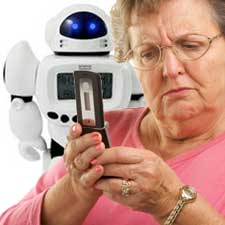My 85-year old Dad took issue with an LA Times interview with Dr. Sherry Turkle warning about the inhuman side of technology and the dangers of virtual companionship. In fact, my parents were sufficiently worked up that they emailed me the whole article along with a list of all the benefits of the digital age from their eyes.
According to Lori Kozlowski’s article, Dr. Turkle, a well-known social scientist, has concerns about what she perceives as a growing tendency to rely on technology above human interactions. She also worries about what she sees as a mounting teenage anxiety over posting on Facebook, the potential vulnerability of people if they become attached to things like robots because of the human need to nurture, and the inadequacy of Twitter’s 140 characters messaging relative to face-to-face interaction.
I wouldn’t have seen this article if my folks hadn’t sent it to me, but felt it worth comment. My dad just had open heart surgery. He’s doing great, thanks for asking. Part of the reason my Dad is recovering so well is that he has been receiving supportive and loving emails and Facebook messages (yes, he’s got a Facebook page) from friends and family literally all over the world. Almost none of them are close enough to visit in person, and even if they were, it would be impossible for him to actually recover if he were to have that many visitors.
My parents have friends they see regularly and under normal circumstances they are hardly shut-ins. But they use email and Facebook to have regular contact with grandchildren in high school and off at college in London, Washington, Oregon, New York, Los Angeles, Sacramento, and San Francisco. None of the kids are closer than a four-hour drive. Long retired, my parents are also in touch with old colleagues, friends, and cousins who are scattered around the country. They share jokes, plan events, and keep up with each other’s lives. The benefit of the digital contact really shows when they see the kids at family gatherings. There is no awkward gap or stilted conversations. They know who’s playing which sport, who rushed a sorority, who loves their classes, who is writing computer code, and who wishes they’d never heard of Oceanography.
I admire Dr. Turkle’s work, but I don’t worry about technology use nearly as much as I worry about the inherent fear of technology that this kind of article promotes. We all have biases about how the world works. Only the most recent generation is growing up with this level of digital connectivity. They will have their own distinct view of what works.
Here’s what I worry about:
- How many of the assumptions that we have are based on what works from our own point of view, such as when Dr. Turkle suggests that we need to be alone as a requirement for restoration and renewal?
- How much of our bias drives the questions we ask in research? If we are working from the basic assumption that the way we used to do something is the right way, we will continue to ask, what’s wrong with media technologies? And from that perspective, we will surely find it.
- Do we ever even ask the texter, the gamer, or the retiree not just what media use means or how it feels from their point of view, but the goal of their effort? If we do ask, do we listen? How many of you have asked your kids, “Are you sure you can concentrate on your homework and instant message or text?” Was it rhetorical or did you actually listen to the answer?
Along those lines, there were several points reported by Ms. Kozlowski that raised questions for me. For example, Dr. Turkle is quoted as saying:
“In Japan, there’s this giant push for robots for the elderly. They argue there aren’t enough people to take care of the elderly. There’s a second vulnerability at work, as well: The guy who visits his mother and says, “If I leave her staring at a wall when I leave the nursing home, I feel terrible; if I leave her staring at the television, I feel not so terrible; if I leave her playing with a robot, I feel OK.” It makes us feel better as children to see the interaction. But not all interaction is equal.”
 This scenario is a moral judgment about the behavior of the guy visiting his mother. Of course all interaction is not equal. Even hypothetically, this presumes that the guy who visits his mother should be providing personal care. That is the ideal. But this is the real world. What is the available menu of options? Is a qualified human caretaker a feasible financial option or even available? We should be asking, is this a reasonable alternative to a less than perfect situation? What about the elderly receiving human care that isn’t good? We all know there are cases of elder neglect and abuse in retirement home settings and families stretched to the limit of financial and emotional resources. Given that choice, I think a robot that looks like a Teddy Bear seems like a pretty good idea.
This scenario is a moral judgment about the behavior of the guy visiting his mother. Of course all interaction is not equal. Even hypothetically, this presumes that the guy who visits his mother should be providing personal care. That is the ideal. But this is the real world. What is the available menu of options? Is a qualified human caretaker a feasible financial option or even available? We should be asking, is this a reasonable alternative to a less than perfect situation? What about the elderly receiving human care that isn’t good? We all know there are cases of elder neglect and abuse in retirement home settings and families stretched to the limit of financial and emotional resources. Given that choice, I think a robot that looks like a Teddy Bear seems like a pretty good idea.
Dr. Turkle also says,
“To me, having an elderly woman talk about the death of a child, the loss of a spouse, fear about the end of life, to something that doesn’t understand what a life is, what a child is, what death is, what it means to face the end of life – this is not an appropriate companion.”
Having an elderly woman talking about serious issues to something that doesn’t understand also rules out dogs, cats, birds, and other domestic pets. There’s lots of research that shows that pets are a valuable asset in the lives of elderly and also that disclosure contributes to increased subjective well-being at all ages. What’s the difference between journaling and ‘roboting’? And why do we assume that the use of a robot means no human contact at all?
Concerns about teenagers seeking social validation tell me that nothing has changed at all in the land of teenagers. Every teen seeks social validation, whether it’s on the phone, at school, on Facebook, at the mall or driving a ’56 Chevy and hanging out in the parking lot of In-N-Out Burger.
I think of Twitter as a staccato mash-up of CNN, Entertainment Tonight, and Facebook-lite for connection, although teens are not, by and large, big users of Twitter. Just like Mary Ainsworth’s toddler studies on attachment, Twitter allows you to make frequent touches to reaffirm connectedness whether it’s with friends or the world. It doesn’t replace face-to-face relationships, but it provides a kind of glue that links the face-to-face experiences and gives them greater continuity and context. Relationships are about a process that unfolds over time. Anything that bridges the gaps between is a benefit.
People don’t fantasize that they don’t need to be with each other. Humans are social animals and the urge to connect is basic survival, practically, emotionally, and genetically. I think that’s a strength, not a potential pitfall. Every computer-mediated communication is in pursuit of more, not less connection. Or, as Mom said, “Technology brings a small cozy community to family life and friend life that would never have been possible without it.”

 Dr. Pamela Rutledge is available to reporters for comments on the psychological and social impact of media and technology on individuals, society, organizations and brands.
Dr. Pamela Rutledge is available to reporters for comments on the psychological and social impact of media and technology on individuals, society, organizations and brands.
Very interesting article on technology and its impact. I completely agree with you that humans are inherently very social creatures. This has never been more apparent than now, when “social media” is making its way to the forefront of technology.